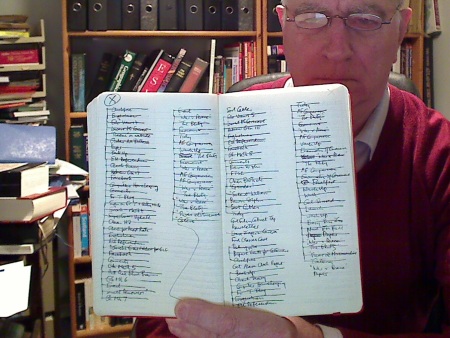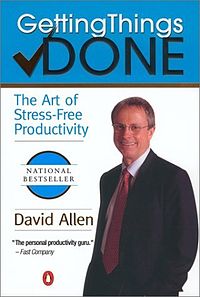This is Week 19 of a Year of Living Productively
This week I tested Mark Forster’s Ultimate Time Management System. I used a paper list of things I wanted to accomplish in the next two weeks. I worked the old list in any way I wanted, but had to continue through the newly added list of tasks, having to return to the old list when the end of the new list was reached. Scroll to the bottom of last week’s post for more details.
How the Ultimate Time Management System Saved My Sanity This Week
- Had me focused on accomplishing “old” tasks. I’ve mentioned before how much I like a closed list of tasks. I found myself very motivated to cross off to-do’s that have been languishing in favor of the new shiny tasks I added.
- Gave me an overview of how quickly tasks add up. Adding tasks to IQTell can shield me from the sheer number of them. Not so with a paper list.
- No complicated rules. I really didn’t feel hampered in any way as I did what I felt needed doing.
How the Ultimate Time Management System Made Me Crazy This Week
- I resisted adding new tasks to the list. Instead of writing them down and seeing my list grow (and potentially keeping myself from doing what I wanted to do), I just DID the new shiny things. A big part of the problem was having a paper list. The list was in one part of the house and I was in another. Why bother finding it to write down a new task when you can just do it? That was my philosophy this week anyway. Unlike DIT, the system offers no clues that you are taking on too much work.
- The closed list was too large. On Mark’s forum, Seraphim, mentioned using a one-week time frame for the old list. I think that would have helped a lot. Doing a two-week test made me feel like there was no way I could finish the old list, so I gave up.
- Things fell through the cracks. Every day, I put a dot in front of the tasks I really needed to accomplish that day. That helped. But I found myself missing things anyway, because I wasn’t using my Due Today IQtell list.
- No big picture. There was such a large mishmash of tasks and projects on the list with no prioritization, that I felt disoriented. Reading the whole list every day was time-consuming and anxiety-provoking.
Did the Ultimate Time Management System Help Me Get More Done?
At first, yes. But after several days, the motivation to finish the old list disappeared. I think a week’s list of things you think you can realistically do might have been more effective. The rules didn’t help me with procrastination, but that’s most likely because I got nowhere near the end of the old list.
**UPDATE**
I honestly don’t worry about old lists of tasks anymore. I look through my list of tasks on ToDoist and choose one per area during my weekly planning session. I often delete tasks that have become irrelevant at that time.
The Productivity Approach I’ll Be Using for Week 20
This week I’ll be testing David Allen’s Getting Things Done. I’ll be using IQTell to collect everything I need to do. I’ll be organizing my tasks by priority (I use Must, Should, Could), context (iPhone, errand, etc.), and by time and energy required. Tasks will be sorted into appropriate projects. Rather than Someday/Maybe, tasks will be given a date to consider them in the future. Why? Have you seen Pinterest? That’s my Someday/Maybe list. The notion that I could review all of my Someday/Maybe’s every week during a review is just funny.
The concept. David Allen‘s primary goal seems to be not just helping people get things done, but to have peace of mind while doing so. He points out that unless we put all of our potential tasks into a “trusted system” (that we know will keep us from forgetting the important stuff), we will continue to be anxious about them. A weekly review is done of everything on our plates (paper inboxes, meeting notes, project support files, etc.), allowing tasks to be trashed, filed, done (if less than 2 minutes – though he mentions situations for which this time varies), delegated, or deferred (put on calendar or into a task list). He suggested this weekly review take place on Friday so the weekend can be peaceful, but any day that works is acceptable.
Projects are worked on in terms of Next Actions — the next physical action you can take to move the project forward. The idea is that we often resist work because we haven’t made the steps required clear. “Plan birthday party” might have a Next Action of “Make a list of potential dates.”
Much criticism has been made of David’s concept of working according to context in our age of smart phones and ubiquitous computers that enable us to do so much. However, rereading the book surprised me that context is just one way David says we can choose to actually do the work. Once all tasks are in your system (paper or digital), you may be working completely around your calendar (e.g., meetings) or you could choose to work by priority (nothing about GTD prohibits Eat That Frog, for example), time required (I have 15 minutes before I have to leave) or energy level (at the end of the day, you may want to read, listen to podcasts, or watch videos, for example).
If you’d like to join me this week, here’s what you do. Read this summary of Getting Things Done. You’ll see there is more to the philosophy than I’ve mentioned. Choose a system to collect your to-do’s. Any inexpensive office store planner would do the trick. Besides IQTell, here is a list of free sites for managing GTD digitally. This infographic may help you in organizing your work after collecting it. Then get things done!
Click here to see how my week of contexts in GTD went.
Are you on Pinterest? Follow my Organization and Productivity board.
If you’ve tried Mark Forster’s Ultimate Time Management System to increase your productivity, please vote in the poll below.
Here are the links to the productivity hacks I’ve tried so far:
Week 16: David Seah’s 7:15AM Ritual
Week 17: Another Simple and Effective Method
Week 18: Daily/Weekly/Monthly To-Do List









Melanie, although I have visited your site a few times recently, I saw your feedback on Mark F’s website.
I’m in my mid 60s, still searching for that nirvana for personal productivity! I suspect I have elements of ADHD, too late to remedial therapy/medication, old dog/new tricks situation.
I am posting because yours is the first site that I’ve seen IQTELL. I first got into GTD in 2005, was quite enthusiastic, but did not like the ‘overhead’.
In 2009 I started with Mark F’s Autofocus and loved it, have tried any number of variations. I am determined to get an electronic solution, want to get away from paper for almost good.
I will monitor your site to see how you get on, I’ve about to register with IQTELL.
Kind regards,
Roger
Roger, so kind of you to comment. I think you can learn new strategies for your style at any age. I find that electronic reminders are invaluable for distractible types like me. I really like IQTell. People who aren’t computer savvy may struggle a bit because its very customizable. That benefit makes it harder to use for some folks. The ability to star my emails in Gmail on my mobile device and have them automatically become tasks in IQTell is such a joy for me! You can find out how on the IQTell blog.
GTD… It sounds so good. D. Allen is a master at selling practical solutions to interlocking and complex problems. Mind Like Water… now who wouldn’t want that? In an attempt to give GTD a fair shot, I recently attended (and paid out of pocket for) a GTD seminar, as well as joining GTD Connect. Conclusion: I found the system encourages “best practices” that interfere with Quad 2 (Covey) activity. I felt like I was back, working a large mental health hospital, doing make-work projects. Worse – the hyperbole (something a lot of therapists & self-help authors fall victim to) around some of the foundational ideas of GTD were a distraction – making me question the efficacy of the process.
Avrum, thanks for weighing in. Can you explain what you mean about GTD encouraging make-work projects? And which best practices are a problem for you?
From the label-maker suggestion to the: “without contexts, how the hell are you going to know what to do should you have 5 minutes to spare” shtick… a lot of your energy goes into moving things around. The promise is lowered stress and improved productivity. I’m calling shenanigans on lowered stress.
His definition of projects (anything requiring more than one action step) adds needless complexity to one’s system.
The coaches are adamant about going through your entire list and rejigging wording to include verbs, etc. I think this is ridiculous. I’d wager that 95% of procrastination is due to resistance (something S. Pressfield does a wonderful job with), and GTD offers great avoidance activities.
Allen believes our minds are terrible storage containers. He urges people to capture every thought (using notepads, audio recorders, etc). At first, you do your best to keep up with this practice. So you invest in tools and capture devices, all of which becomes an albatross towards any type of flow activity, as you do your best to capture every last thought. Again, the promise is “mind like water”. So you do your best to obey the rules. But the mind is a funny thing, the more you look for stuff, the more stuff appears. I have no doubt Allen sees this as a good thing… a sign the “mind like water” messiah is around the corner. Personally, the only thing I discovered were bloated lists of inconsequential stuff.
His weekly review is bloated, and full of over-promises.
I can go on and on. Cal Newport did a pretty good here: http://calnewport.com/blog/2012/12/21/getting-unremarkable-things-done-the-problem-with-david-allens-universalism/
Avrum, those are great insights. Thank you!